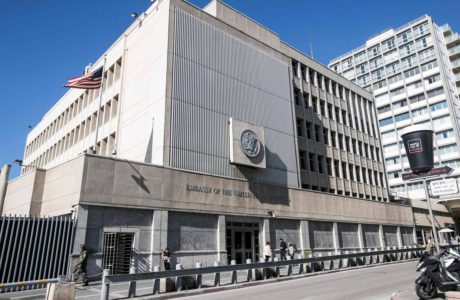
The U.S. Embassy in Tel Aviv. Photo: jack guez/Agence France-Presse/Getty Images
WASHINGTON—The Trump administration is considering a plan to formally recognize Jerusalem as the capital of Israel and to move the U.S. Embassy there in the future, U.S. officials said, steps that could trigger Palestinian protests and imperil the restart of a long-stalled peace process.
The Trump administration this week notified U.S. embassies overseas about the plan and a possible forthcoming announcement so envoys can inform their host governments and prepare for possible protests.
Officials said the plans weren’t final, however, and the U.S. was working through additional legal and policy considerations. A formal announcement could come as early as next week, the officials said.
“The president has always said it is a matter of when, not if,” a White House spokesman said when asked about moving the embassy. “The president is still considering options and we have nothing to announce.”
Officials said the administration is mulling laying out a long-term plan to move the embassy that would play out in President Donald Trump’s second term, should he be re-elected.
The disclosures about the potential move come as Mr. Trump faces an early December deadline under U.S. law to move the U.S. Embassy to Jerusalem or sign a presidential waiver to keep it in Tel Aviv.
It was unclear what Mr. Trump would decide on the waiver question, but officials said one option would be to recognize Jerusalem as the capital and announce plans for the embassy move, but postpone the actual relocation for several years. In the interim, the U.S. ambassador to Israel could work from Jerusalem instead of Tel Aviv, the current site of the U.S. Embassy.
The administration also could choose to recognize Jerusalem as the “undivided” capital of Israel, one of the officials said.
Any U.S. move to declare Jerusalem as Israel’s capital would likely be taken as an affront by Palestinians, who consider East Jerusalem the capital of a future state. U.S. officials said they were weighing those concerns.
Vice President Mike Pence, in an address before a pro-Israel audience earlier this week, reiterated Mr. Trump’s campaign pledge to move the embassy to Jerusalem, without saying when or how it would be done.
Mr. Trump in June waived the provisions of the 1995 law requiring the U.S. to move the U.S. Embassy to Jerusalem, saying a postponement would aid the chances for a peace deal between the Israelis and Palestinians. The Trump administration has been working to develop a Middle East peace push, led by Mr. Trump’s son-in-law Jared Kushner and his chief negotiator, Jason Greenblatt.
Mr. Kushner was set to speak publicly about that effort for the first time on Sunday at an event in Washington.
Since the 1995 law took effect, Democratic and Republican presidents have repeatedly opted not to move the embassy, citing national security concerns.
Diplomats and analysts expressed concern that moving the embassy could endanger prospects for a peace accord because of Jerusalem’s disputed status. Supporters of the move say it would show the U.S. recognizes Jerusalem as Israel’s capital.
A change in U.S. policy on Jerusalem is certain to further frustrate a Palestinian leadership already at odds with the White House. Palestinian officials have warned that moving the U.S. Embassy to Jerusalem could lead to violence in Israel and the Palestinian territories.
“If this is true, then the American standing will be shaken not only in the Palestinian context but in all the Arab and Islamic World,” said Hanan Ashrawi, a senior member of the Palestine Liberation Organization, which negotiates with Israel in peace talks. “This is a total annihilation of the opportunities of peace.”
A spokesman for Israeli Prime Minister Benjamin Netanyahu declined to comment.
Yossi Kuperwasser, a former head of Israel’s military intelligence research, also acknowledged the risk of violence.
“I guess they realized that Jerusalem is the capital of Israel,” he said of the U.S. administration. “[The Palestinians] are going to protest fiercely and express their unhappiness. We may have some violent repercussions. Even if there is a wave of violence, it will die eventually.”
The international community doesn’t recognize Jerusalem as Israel’s capital, conducting diplomacy from nearly 90 embassies in Tel Aviv. Israel has administered Jerusalem since 1967, when it won control of the eastern half of the city in the Six Day War. Many Israeli government buildings are based in Jerusalem, including the parliament and supreme court.
Questions surrounding the status of Jerusalem and the holy sites within the city are highly sensitive. In July, Israel’s installation of metal detectors at one of the city’s holiest sites triggered deadly violence. Israel installed the detectors at the entrance to the site—known to Muslims as the Noble Sanctuary and to Jews as the Temple Mount—after Arab gunmen killed two Israeli policemen there.
Jordan’s King Abdullah II has repeatedly warned U.S. officials both in public and private against moving the embassy, saying it would likely cause violent protests not only in Jerusalem but also other Arab capitals.
Much of the international community considers Israel’s control of East Jerusalem, the West Bank and the Gaza Strip to be an illegal occupation. A United Nations Security Council resolution in December 2016 reaffirmed that Israeli settlement in the West Bank and East Jerusalem was illegal.
The U.S. abstained from voting on that resolution rather than using its veto power to kill it—an Obama administration decision that was harshly criticized by Mr. Trump, then the president-elect.
The Trump administration hasn’t committed publicly to the establishment of a Palestinian state, saying doing so would bias negotiations. That stance, which reverses a decades long U.S. policy, has frustrated Palestinian officials, they say.
Mr. Trump declined to endorse a two-state solution during a news conference with Mr. Netanyahu in February, saying he was happy to agree to whatever solution both sides endorsed.
Source: The Wall Street Journal
